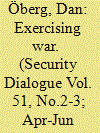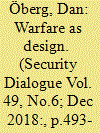| Srl | Item |
| 1 |
ID:
175119


|
|
|
|
|
| Summary/Abstract |
This article analyzes how contemporary military training and exercises shape and reify specific modalities of war. Historically, military training has shifted from being individual- and experience-oriented, towards becoming modelled into exercise environments and practices. Drawing on semi-structured interviews with military officers, exercise controllers, and war-game designers, the article distinguishes between tactical training, characterized by military functions embodied through weapon platforms in a demarcated battlespace, and operational training, characterized by administrative and organizational processes embodied through self-referential staff routines. As military exercises integrate the tactical and operational dimensions into a model for warfare, they serve as blueprints for today’s battles at the same time as they perpetuate a martial viewpoint of the world. As a result, preparations for potential future conflicts constitute a fertile ground for apprehending the becoming of war.
|
|
|
|
|
|
|
|
|
|
|
|
|
|
|
|
| 2 |
ID:
162416


|
|
|
|
|
| Summary/Abstract |
This article argues that the politics of contemporary Western warfare finds an important reference point in discourses on military design. In the 2010s, military design has become a trending topic in military discourses on command and planning methodology. Since Clausewitz, warfare has been considered a phenomenon characterized by a tension between creativity and linear planning, and the ideal commander as someone with the vision to overcome this. By mapping and analyzing tactical, operational, and strategic narratives and practices, the article illustrates how they emphasize a warfare based both on experimentation and artistry and on traditional operational planning. In so doing, military design relies on reductive military concepts to push the tension identified by Clausewitz towards its extreme end-point, idealizing creativity as an objective of warfare. The article ends by asking to what extent military design risks spilling over into other dimensions of social and political life. It concludes that in pushing creativity as part of war, military design builds on and justifies transgressive political practices with the risk of becoming a vital aspect of future governing.
|
|
|
|
|
|
|
|
|
|
|
|
|
|
|
|